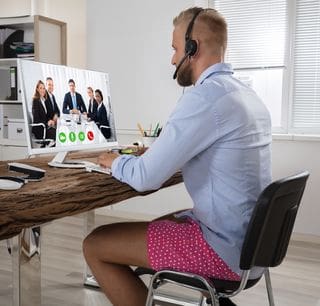Search Posts
Recent Posts
- Outdoors in RI: Help keep recreation areas clean. Invasive Milfoil, trash. 2A update – Jeff Gross July 26, 2024
- Real Estate in RI: Highest-ever sale in Queen’s Grant, EG $1.25M, by Residential Properties July 26, 2024
- Homeless in RI: Gov. Newsom issues Executive Order. Remove California’s encampments. July 26, 2024
- Let the games begin. XXXIII Summer Olympics – John Cardullo July 26, 2024
- GriefSPEAK: What would you do? – Mari Dias Nardolillo July 26, 2024
Categories
Subscribe!
Thanks for subscribing! Please check your email for further instructions.

COVID-19 Pandemic: Forcing the new Work from Home culture
COVID-19 Pandemic – Forcing the New Work from Home Culture
By Mary T. O’Sullivan, MSOL
(Photo: Psychology Today)
“Wake up and get ready just like you’re going to work [in the office]. If you stay in your slippers all day you will not be as productive.” Elijah Schneider, CEO & founder of Modifly
For the last six years, I have worked from home, or in a rented office that I occupy alone. The challenges I faced were not connected to my desire or my drive to complete tasks or work with clients. The hard part was getting used to a different routine and a new daily structure. At my one-person office, I wasn’t even sure what to do first, hang up my coat, turn on the lights, put away my lunch, or get my computer into the docking station. I felt confused as soon as I unlocked the door and walked in. At home, I couldn’t figure out how to organize myself. I picked an uncomfortable chair, didn’t use a monitor, and ended up being very distracted by my surroundings. I also missed the company of co-workers, the undercurrent of office babble and got weary of eating lunch alone.
Now, I’ve made some adjustments to make my work more fun and more social. Here’s what I learned to do as a veteran Work from Homer (WFH).
- Establish a routine – Keep your schedule the same as you would in your office as much as possible. This means that you get up at the same time, exercise at the same time, eat meals at the same time as often as possible. A big temptation is to keep your nose to the grindstone and working without looking up. Try to keep the same scheduled work hours as you would in the office. Don’t work more than you normally would and don’t cut your workday short.
- Your routine must include getting dressed. You’ll feel more professional and productive. Again, the temptation for distractions is high in your home environment. Don’t give yourself that chance. If it’s 9:00AM and you’re still in your pajamas, step away from your laptop, and get into the shower.
- Find a designated place to work – don’t work from the couch or from bed and turn off the TV. “Kelly and Ryan” won’t care if you miss their show. You’ve missed it for years anyway. Set up a place that’s yours and yours alone, even a corner of your basement with cinderblocks and a piece of plywood. You need to focus. And find a comfortable chair, add pillows and pads to protect your back and neck.
- Chunk your time and exercise. Give yourself a certain amount of time for each task. Set a clock to remind you how long you’ve been working. Working from home without natural co-worker connections can allow us to get lost in our work. Hours may go by, and you realize that you’ve missed lunch, and maybe skipped a bio break. Set aside certain amounts of time for each project. Include time for exercise, healthy meals, and just getting up and walking around. You may want to walk up and down stairs or create a walking path around the house to keep your muscles from stiffening up. Avoid “tech neck” by stretching. There are apps and programs to keep you limber. You can also stream a virtual yoga or workout class. Many are free right now.
- Along those lines, you will need a clock and calendar on or near your desk. It’s too easy to forget you have a client, conference call or a scheduled meeting since you’re totally absorbed in work. Other times, you can become unaware of what day it is. You don’t want to miss meetings, phone calls, or webinars because you lost track of the day of the week. I’ve done this too many times myself.
- Take breaks at the same time you would at work. Socialize with co-workers via virtual means, Zoom, Skype, Facetime, etc. You want to know what everyone else in your office is up to. Keep that sense of connection and break up the monotony.
- Avoid the urge to graze and snack and stay hydrated. Get up from your desk and make yourself a cup of tea or coffee and stay out of the cupboards. Those cookies, candy bars, and chips are for the kids, remember?
- Avoid social isolation – Take networking breaks with others in your profession or with a group of friends on a virtual call. Social connections lift your spirit and put you in a better mood. Find online networking events and sign up. Many of these virtual events are free or low cost. It’s easy to feel isolated and lonely when working in a solitary environment. Check Facebook and LinkedIn for virtual networking events.
- Give yourself some downtime in between your end of workday and your dinner time. Close down the laptop, turn off the phone and relax for about 30 minutes before diving into your evening routine. Don’t jump right into dinner. You’ll feel rushed and under pressure and may eat too fast. Relax, it’s better for your digestion.
- Take a news “fast”. You don’t need to stress yourself out any more than you already are.
- If you have a house cleaning service and they are not coming to your home due to COVID-19, get your kids involved. A 10-year-old can vacuum, load the dishwasher, clean his/her own room and take charge of caring for your pets.
- When your kids are small and very distracting, you may want to consider renting an office for a month or two. You can swap work time with your spouse, so each of you has some productive time alone. Liquid Space is a great resource for renting office space by the day or even by the hour. Your local co-working space may also offer alternatives for working from “home”.
- Make it clear to your family that you are working. You’re not available for any other activities. Devote some time to overseeing kids’ schoolwork, but if you normally help them in the evening, stick to that schedule. You’re at work, just as you are normally, and make sure the whole family knows that.
- Get outside if the weather permits. Play with your dog, take a short walk. Those ultraviolet rays are healthy for you; it improves your mood, helps you sleep better, strengthens your immune system, lowers your blood pressure, and even keeps your bones healthy. Sitting all day is as bad for your health as smoking.
- If you’re a manager, make sure to check in regularly with your team. Research has shown that remote teams function much better with a sense of connectiveness to management. In particular, when the manager shows up and shows care and concern for his/her team, the team performs at a higher level. There’s no need to hover or micro-manage, just let people know you’re there when they need you.
Working from home does take some getting used to. It’s different than being in the office with a morning and evening commute and a normal pace of work. It can be isolating and distracting. The dog will bark in the middle of a conference call. Your cat may saunter across your laptop while you ponder a complex spreadsheet. The kids may fight among themselves, or barge in when you least expect it. Distractions like this will abound. You need to keep your sense of equilibrium and sanity and practice the all-important elements of self-care: keep a routine, exercise, use technology for work and social connections, set boundaries between your work and home, keep your workspace tidy, make time for a lunch break, have a designated workspace, and get your family to help around the house. You’re working from home, it’s your livelihood, you need this job, so perform as if your income depended upon it, because it just may.
Connect with Mary
www.encoreexecutivecoaching.com
401-742-1965
Mary T. O’Sullivan

Mary O’Sullivan has over 30 years of experience in the aerospace and defense industry. In each of her roles she acted as a change agent, moving teams and individuals from status quo to higher levels of performance, through offering solutions focused on changing behaviors and fostering growth.
Mary has a Master of Science in Organizational Leadership from Quinnipiac University. In addition, she is also an International Coaching Federation Professional Certified Coach, a Society of Human Resource Management Senior Certified Professional and has a Graduate Certificate in Executive and Professional Coaching, from the University of Texas at Dallas.
In her leadership and executive coaching, she focuses on improving the executive behaviors that slow down performance and lead to growth, such as soft skills, communication, micro-bias awareness, etc. She has successfully helped other professionals, such as attorneys, surgeons, pharmacists, and university professors, make career decisions to lead to success in their chosen careers. In addition, small business owners have sought Mary’s services to bring their companies into greater alignment, working on their culture, vision, mission, values and goals as well as organizational structure. Mary’s executive coaching has been mainly with large organizations among them: Toray Plastics America, Hasbro, Raytheon Company, Lockheed Martin, CVS Healthcare, Sensata Technologies, Citizen’s Bank, Ameriprise, BD Medical Devices, Naval Undersea Warfare Center, (Newport, R.I.), General Dynamics, University of Rhode Island, Community College of Rhode Island, etc.
Mary has facilitated numerous workshops on various topics in leadership such as, emotional intelligence, appreciative inquiry, effective communication, leading in adversity, etc. She has also written extensively on similar topics.
Mary is also a certified Six Sigma Specialist, Contract Specialist, IPT Leader and holds a Certificate in Essentials of Human Resource Management from the Society of Human Resources Development. Mary is also an ICF certified Appreciative Inquiry Practitioner, and a Certified Emotional Intelligence assessor and practitioner.
In addition, Mary holds a permanent teaching certificate in the State of New York for secondary education with Advanced Studies in Education from Montclair University, State University of New York at Oswego and Syracuse University. She is also a member Beta Gamma Sigma and the International Honor Society.
Mary dedicates herself to coaching good leaders to get even better through positive approaches to behavior change for performance improvement.
